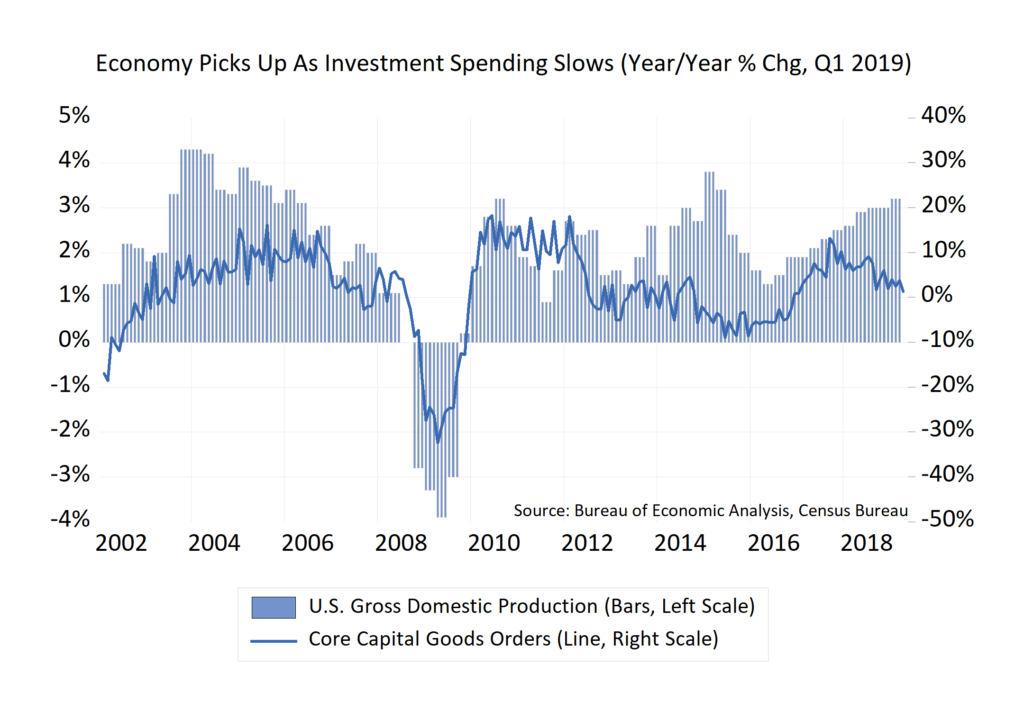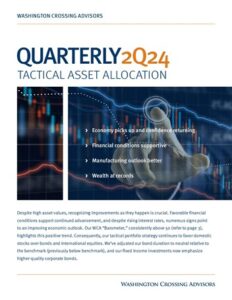Growth Picks Up as Investment Lags
Last week we learned the United States’ economy expanded at 3.1% from a year ago through the first quarter. As the bars in the chart below shows, this marks a continuation of an accelerating growth trend that began in 2016. The improvement came despite headwinds including an escalating U.S. / China trade war, a government shutdown, Europe’s political unrest, and volatile markets at the end of last year. The positive growth trend is not seen in business investment, however, and this is concerning to us. Last week’s GDP report, for example, revealed that nonresidential fixed investment (business investment) rose at an annualized pace of only 2.3% in the first quarter, below the growth rate in overall GDP. The 2.3% growth in business investment is also down from a 5.4% pace in the fourth quarter.
Even more recently, we saw a disappointing April capital goods orders report. This suggests business confidence may have worsened as we began the second quarter. April’s durable goods report cited a 0.9% decline in non-military capital goods orders. This follows a downward revision of a 0.3% gain for March. This puts the year-over-year growth rate for core capital goods orders up just 1.3%, well below the economy’s 3.1% year-over-year growth rate (chart, below). The trade war with China and an inventory buildup are the likely reasons for the recent weakness. The Trump Administration imposed 25% import tariffs may further soften the May numbers. Durable goods spending is an important barometer of economic health and business confidence. A high degree of forward looking business spending supports higher stock prices. We raised our equity allocation from underweight stocks to just above neutral as data improved through the quarter. We will hold our asset mix firm unless we see a sustained and broad-based deterioration in the data.

Kevin Caron, CFA, Senior Portfolio Manager
Chad Morganlander, Senior Portfolio Manager
Matthew Battipaglia, Portfolio Manager
Steve Lerit, CFA, Client Portfolio Manager
Suzanne Ashley, Analyst
(973) 549-4168
www.washingtoncrossingadvisors.com
www.stifel.com
Disclosures
WCA Fundamental Conditions Barometer Description: We regularly assess changes in fundamental conditions to help guide near-term asset allocation decisions. The analysis incorporates approximately 30 forward-looking indicators in categories ranging from Credit and Capital Markets to U.S. Economic Conditions and Foreign Conditions. From each category of data, we create three diffusion-style sub-indices that measure the trends in the underlying data. Sustained improvement that is spread across a wide variety of observations will produce index readings above 50 (potentially favoring stocks), while readings below 50 would indicate potential deterioration (potentially favoring bonds). The WCA Fundamental Conditions Index combines the three underlying categories into a single summary measure. This measure can be thought of as a “barometer” for changes in fundamental conditions.
The information contained herein has been prepared from sources believed to be reliable but is not guaranteed by us and is not a complete summary or statement of all available data, nor is it considered an offer to buy or sell any securities referred to herein. Opinions expressed are subject to change without notice and do not take into account the particular investment objectives, financial situation, or needs of individual investors. There is no guarantee that the figures or opinions forecasted in this report will be realized or achieved. Employees of Stifel, Nicolaus & Company, Incorporated or its affiliates may, at times, release written or oral commentary, technical analysis, or trading strategies that differ from the opinions expressed within. Past performance is no guarantee of future results. Indices are unmanaged, and you cannot invest directly in an index.
Asset allocation and diversification do not ensure a profit and may not protect against loss. There are special considerations associated with international investing, including the risk of currency fluctuations and political and economic events. Investing in emerging markets may involve greater risk and volatility than investing in more developed countries. Due to their narrow focus, sector-based investments typically exhibit greater volatility. Small company stocks are typically more volatile and carry additional risks, since smaller companies generally are not as well established as larger companies. Property values can fall due to environmental, economic, or other reasons, and changes in interest rates can negatively impact the performance of real estate companies. When investing in bonds, it is important to note that as interest rates rise, bond prices will fall. High-yield bonds have greater credit risk than higher-quality bonds. The risk of loss in trading commodities and futures can be substantial. You should therefore carefully consider whether such trading is suitable for you in light of your financial condition. The high degree of leverage that is often obtainable in commodity trading can work against you as well as for you. The use of leverage can lead to large losses as well as gains.
All investments involve risk, including loss of principal, and there is no guarantee that investment objectives will be met. It is important to review your investment objectives, risk tolerance and liquidity needs before choosing an investment style or manager. Equity investments are subject generally to market, market sector, market liquidity, issuer, and investment style risks, among other factors to varying degrees. Fixed Income investments are subject to market, market liquidity, issuer, investment style, interest rate, credit quality, and call risks, among other factors to varying degrees.
This commentary often expresses opinions about the direction of market, investment sector and other trends. The opinions should not be considered predictions of future results. The information contained in this report is based on sources believed to be reliable, but is not guaranteed and not necessarily complete.
Washington Crossing Advisors LLC is a wholly owned subsidiary and affiliated SEC Registered Investment Adviser of Stifel Financial Corp (NYSE: SF).



